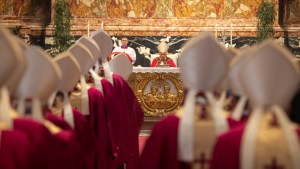Lenten Campaign 2025
This content is free of charge, as are all our articles.
Support us with a donation that is tax-deductible and enable us to continue to reach millions of readers.
As is the tradition during the first week of November, near the feast of All Souls Day, Pope Francis celebrated a Mass on November 4, 2024, in St. Peter’s Basilica, for cardinals and bishops who died during the past year.
This year it was seven cardinals and 115 bishops who have died in the past 12 months.
During his brief homily focused on the Good Thief, the Pope noted how this criminal is an “unexpected voice,” who affirms, “this man has done nothing wrong.”
His prayer to Jesus is: “Keep me alive in your memory. ‘Do not forget me.'”
Here is a Vatican translation of the Pope’s reflection:
~
“Jesus, remember me when you come into your kingdom” (Lk 23:42). These are the last words spoken to the Lord by one of the two men crucified with him. They were not the words of one of Jesus’ disciples who had followed him along the roads of Galilee and shared bread with him at the Last Supper. On the contrary, the man who spoke those words to the Lord was a criminal, someone who met him only at the end of his life, someone whose name we do not even know.
Yet, in the Gospel, the last words of this “outsider” initiate a dialogue full of truth. Even as Jesus was being “numbered with the transgressors” (Is 53:12) as Isaiah had prophesied, an unexpected voice is heard, saying: “We are receiving the due reward of our deeds; but this man has done nothing wrong” (Lk 23:41). So it was. That condemned criminal represents us all; each of us can replace his name with our own. Yet even more importantly, we can make his plea our own: “Jesus, remember me.” Keep me alive in your memory. “Do not forget me.”
Let us meditate on that word: remember. To remember (ricordare) means “to lead back to the heart (cor),” to carry in the heart. That man, crucified alongside Jesus, transformed his dire pain into a prayer: “Carry me in your heart, Jesus.” His words did not reflect anguish and defeat, but hope. This criminal, who died as a disciple of the last hour, desired only one thing: to find a welcoming heart. That is all that mattered to him as he found himself defenseless in the face of death. The Lord heard the sinner’s prayer, even at the end, as he always does. Christ’s heart – an open, not closed, heart – pierced by pain, was laid open to save the world. Dying himself, he was open to the voice of a dying man. Jesus dies with us because he died for us.
Crucified despite his innocence, Jesus answered the prayer of a man crucified for his guilt: “Truly, I say to you, today you will be with me in Paradise” (Lk 23:43). The memory of Jesus is effective because it is rich in mercy. As a man’s life comes to an end, God’s love grants freedom from death. The one who was condemned is now redeemed. The outsider becomes a fellow-traveller; a brief encounter on the cross leads to eternal peace.
This makes us reflect a little. How do I encounter Jesus? Or better still, how do I let myself be encountered by Jesus? Do I allow myself to be encountered or do I close myself off in my selfishness, in my pain, in my self-sufficiency? Do I have a sense of my sinfulness that allows me to be encountered by the Lord, or do I feel righteous and say: “You are not here to serve me. Move along”?
Jesus remembers those who are crucified at his side. His compassion unto his final breath makes us realize that there are different ways of remembering people and things. We can remember our mistakes, unfinished business, friends and enemies. Brothers and sisters, let us ask ourselves today before this scene from the Gospel: How do we carry people in our heart? How do we remember those who were at our side in the events of our life? Do I judge? Do I divide? Or do I welcome them?
Dear brothers and sisters, by turning to the heart of God, the men and women of today and of every age can find hope for salvation, even if “in the eyes of the foolish they seemed to have died” (Wis 3:2). All of history is kept in the memory of the Lord. Memory is safekeeping. He is its compassionate and merciful judge. The Lord is close to us as judge; he is close, compassionate and merciful. These are the three attitudes of the Lord. Am I close to people? Do I have a compassionate heart? Am I merciful?
With this assurance, we pray for the Cardinals and Bishops who died in the last twelve months. Today, our remembrance becomes a prayer of intercession for our dear brothers. Elect members of the People of God, they were baptized into the death of Christ (cf. Rom 6:3) in order to rise with him. They were shepherds and models for the Lord’s flock (cf. 1 Pet 5:3). Having broken the bread of life on earth, may they now enjoy a seat at his table. They loved the Church, each in his own way, but they all loved the Church. Let us pray that they may exult in eternal communion with the saints. With firm hope, let us look forward to rejoicing with them in heaven. And I invite you to say three times with me: “Jesus, remember us!”, “Jesus, remember us!”, “Jesus remember us!”.


